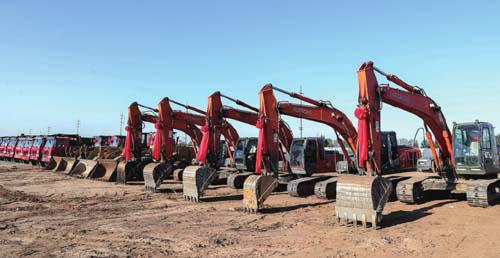Radiating New Vigor
2018-10-31ByDengYaqing
By Deng Yaqing
Widely known in the past as Chinas heavy industry base, northeast China is now in the midst of tremendous change. After wading through a period of economic stagnation, the region has been going all out to pursue a transformation and win favor from both domestic and foreign investors.
At a symposium on pushing forward the revitalization of northeast China held in Shenyang in Liaoning Province on September 28, Chinese President Xi Jinping noted that efforts should be made to improve the business environment and foster new growth engines, stressing the importance of equipment manufacturing for the development of the real economy.
On October 11, German luxury carmaker BMW and its Chinese partner Brilliance China Automotive Holdings Ltd. jointly announced the prolongation of the validity of their joint venture agreement until 2040, with BMW ramping up its investment by 3 billion euros($3.45 billion) and taking a 75-percent majority stake in BMW Brilliance Automotive Ltd.(BBA). On the same day, the construction of a new factory in Shenyangs Tiexi District was begun.
Since 2009, BMW has invested over 52 billion yuan ($7.49 billion) in the Shenyang production base, which is the largest of its kind in its global business map and includes two vehicle production factories in the Dadong and Tiexi districts, along with the one under construction.
A total of 20 billion yuan ($2.88 billion) will be invested in building the new Tiexi factory, which will cover an area of 2.9 square km, with an annual capacity of 400,000 units. Its expected to begin car production in May 2022.
“We are confident that China is an important market for BMW to realize sustained business growth and we will continue increasing our investment and focus on the development and production of electric vehicles,” said Harald Krüger, BMW CEO, adding that BMWs success in the Chinese market would not have been possible without the joint venture with its Chinese partner.
In fact, when Chinese Premier Li Keqiang met with German Chancellor Angela Merkel in Berlin, Germany, in July, they were witness to the signing of the agreement of increased investment in China between BMW and Brilliance.
In his congratulatory letter, Li said that BMW will be the fi rst foreign company benefi ting from Chinas removal of restrictions on the proportion of foreign equity in joint-venture automakers, embarking on a new journey of integrated development, mutual benefits and win-win cooperation for the two countries automotive manufacturing industry.
Merkel made it clear in her congratulatory letter that the BMW-Brilliance agreement signed in July sent a signal of long-term stable and mutually beneficial partnership between China and Germany, adding that her country welcomes Chinas move toward further reform and opening up by expanding market access.
Leaping forward
In 2017, BMW contributed 24 billion yuan($3.46 billion) to the total tax revenue in Shenyang and directly provided 17,000 jobs to local residents. It has been confi rmed that after the completion of the new Tiexi factory and the expansion of the Dadong factory, BBAs total production capacity will gradually increase to 650,000 units, creating another 5,000 jobs.
In addition, beginning in 2020, the first BMW all-electric vehicle, the iX3, will be produced in China and exported to the world. In the future, all BMW iX3 electric cars around the world will most certainly be produced in China, said Krüger.
“BBAs advanced production equipment is a good example of German Industry 4.0 and Made in China 2025. In 2017, roughly 560,000 BMW vehicles were sold to Chinese consumers and about two thirds of them were manufactured by BBA,” said Qi Yumin, Chairman of Brilliance, in an interview with Beijing Review.
“Nevertheless, we have to recognize that Chinese carmakers still lag far behind foreign players in terms of technology and management. The removal of equity proportion restrictions will force Chinese brands to develop independently,” said Qi, who deems it as a good opportunity for Chinese manufacturers to learn from their foreign counterparts.
“Surrounding BBAs automotive production sites, more than 30 supporting enterprises have settled down in Dadong District. In the future, their total output value may reach 200 billion yuan ($28.8 billion),”said Liu Kewu, Mayor of Dadong, noting that BBA plays a leading role in driving the digitalization and intelligentization of the local automobile industry. So far, BBA has developed more than 350 part suppliers in China, over 80 of which are located in Liaoning.
In the past 15 years, as BBA gradually radiated its success, an increasing number of domestic and foreign companies have been attracted to invest in Shenyang. Currently, the China-Germany (Shenyang) Equipment Manufacturing Industrial Park, where the new Tiexi factory will be located, is home to more than 60 automobile part suppliers, including ZF Friedrichshafen, Benteler International and Toyota Boshoku, which make up a highend automobile industrial cluster worth $5.17 billion.
Better environment
Behind the mounting investment from domestic and foreign companies is the constantly improving business environment and talent aggregation. This year, Shenyang was included on the list of 16 pilot cities for reform on the examination and approval of engineering and construction projects, taking the lead in providing fast, quality services.
Streamlined examination and approval procedures are only part of the story. Shenyang is also committed to optimizing the environment on market, social, legal and other fronts, Che Dongyu, Deputy Director of the Offi ce of the Leading Group for Business Environment in Shenyang, said to Beijing Review.
Che approaches the successful management of Shenyangs business environment in two ways. The fi rst is to build a unique leadership structure. “The head of the Leading Group for Business Environment is the secretary of the Municipal Committee of the Communist Party of China (CPC), and all the other leaders of the group are also members of the CPC Municipal Committee. The group is entitled to investigate government offi cials who dont follow rules and regulations on improving the business environment,” said Che, who noted the group has a 10-percent weight in the year-end performance evaluation of related government offi cials.
The second method is to carry out private investigations. “Officials often disguise themselves as citizens to test service quality, making sure that going through formalities is fast and simple and all the items are transparent,” said Che, adding that some 1,300 people have been punished for failing to meet these standards in the past two years.
In addition, a host of measures have attracted talent and professionals to settle down in Shenyang. In 2017, the city recruited 14 academicians from the Chinese Academy of Sciences and the Chinese Academy of Engineering and more than 70,000 graduates, marking a year-on-year increase of 13 percent, while the number of foreign professionals reached 3,758, up 12.4 percent.
“Compared with the brain drain in the past, this is great progress,” concluded Che.
